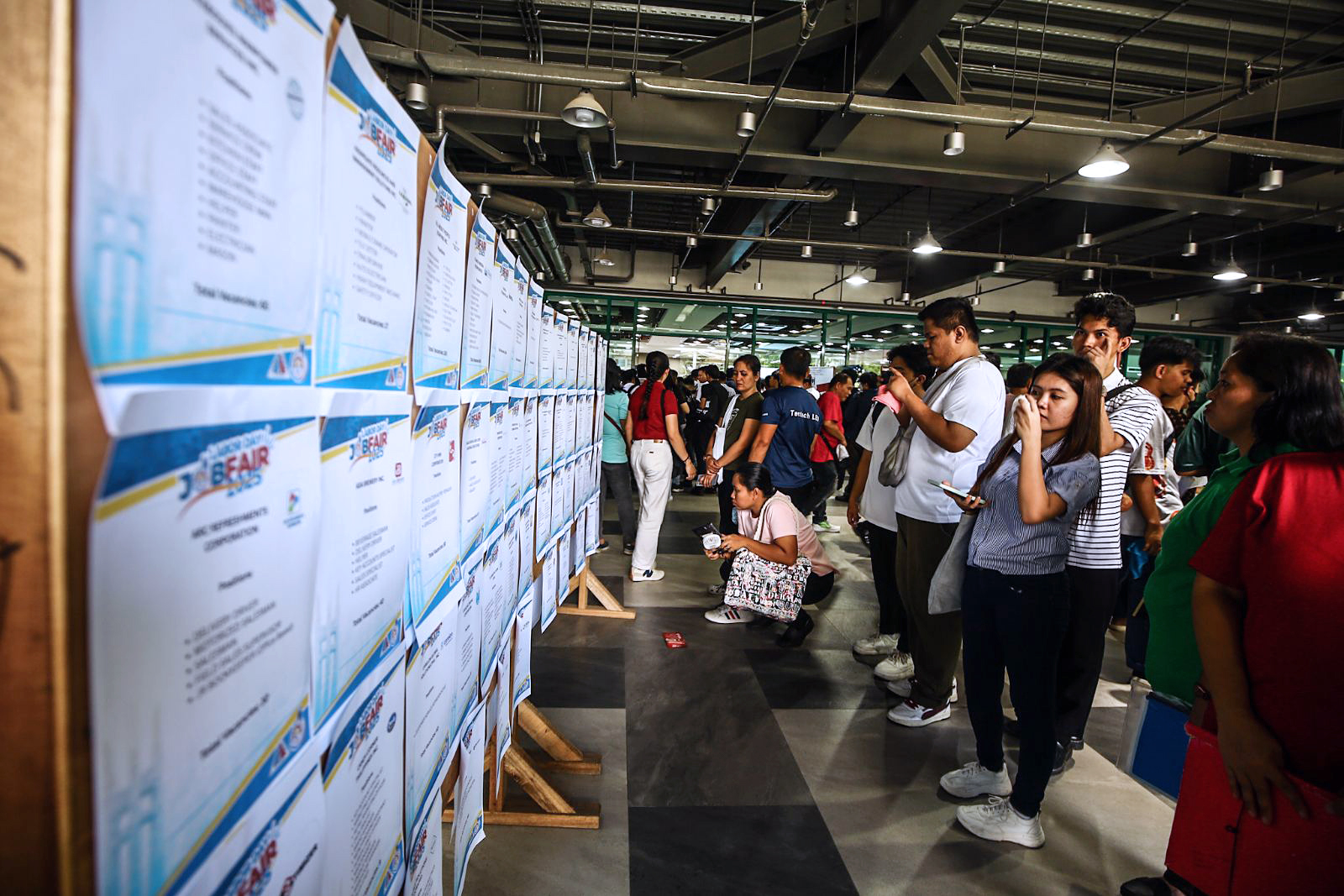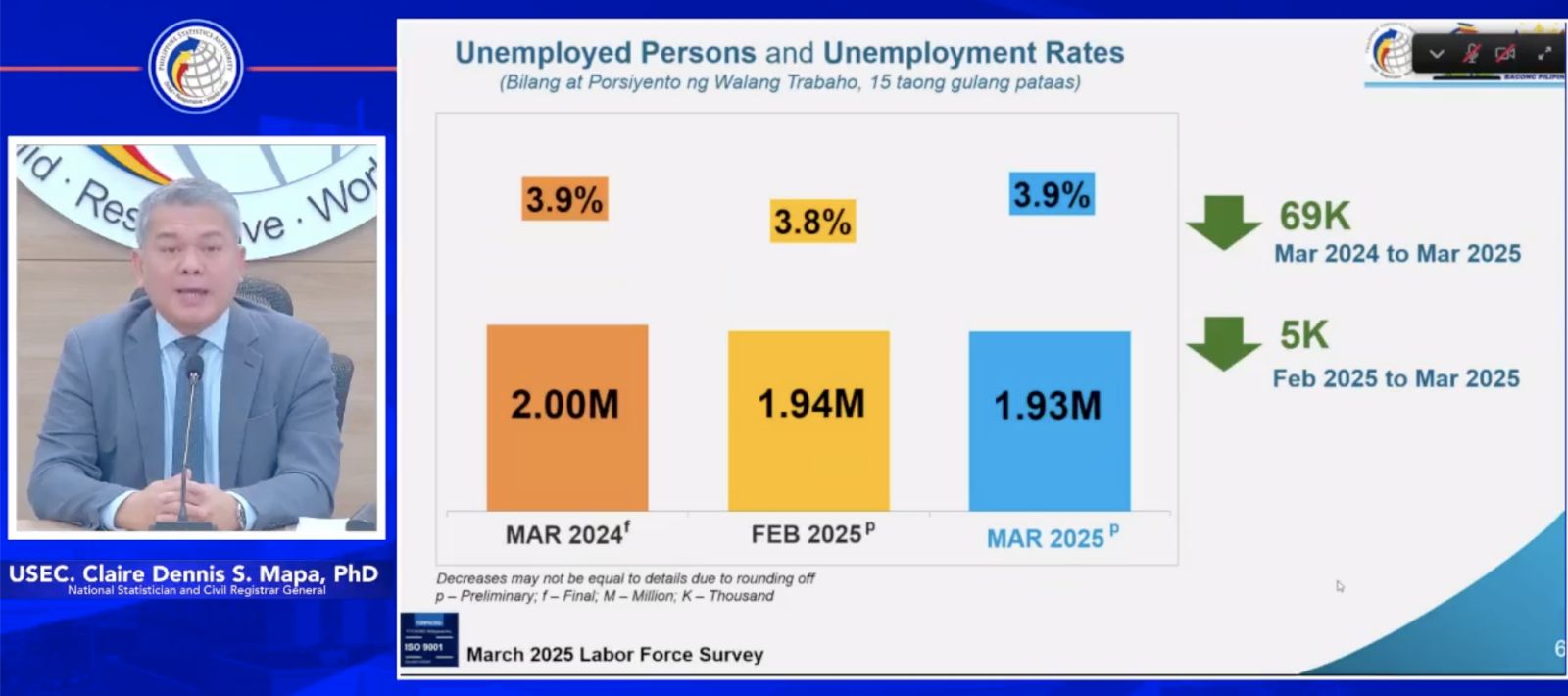
By Anna Leah Gonzales | Philippine News Agency
The administration of President Ferdinand R. Marcos Jr. will implement the Trabaho Para sa Bayan (TPB) Plan to improve job quality and address persistent labor market challenges following the release of the preliminary results of the latest Labor Force Survey, the Department of Economy, Planning, and Development (DEPDev) said on Wednesday.
Data released by the Philippine Statistics Authority (PSA) showed that the number of jobless Filipinos slightly declined to 1.93 million in March from 1.94 million in February, translating to an unemployment rate of 3.9%.
However, PSA Undersecretary and National Statistician Dennis Mapa said both the labor force and employment levels declined by about 1.2 million.
This resulted in a labor force participation rate of 62.9% in March 2025, down from 65.3% in the same period last year.
Mapa said schooling and household responsibilities were cited as the primary reasons for individuals not actively seeking employment.
The country’s underemployment rate, likewise, went up to 13.4% in March from 11% in the same month last year.
This translates to approximately 6.44 million Filipino workers seeking additional hours, a second job, or a new job with longer working hours.

“The launch of the Trabaho Para sa Bayan Plan is both timely and essential. The latest employment figures highlight the need for a comprehensive set of interventions to increase investments, encourage technology adoption, improve job satisfaction and employment quality,” DEPDev Undersecretary for Policy and Planning Rosemarie Edillon said.
Launched on Monday, the TPB Plan is the country’s first 10-year Labor Market Development Plan, which provides a long-term strategic framework for job creation, labor market transformation, and inclusive workforce development.
The plan includes the promotion of lifelong learning and the implementation of accelerated learning pathways, such as micro-credentials, to address underemployment and skills mismatches.
“The TPB Plan will serve as our strategic roadmap toward building resilient employment, fostering competitive enterprises, and preparing a future-ready workforce,” Edillon said.
Under the TPB Plan, the private sector is also expected to help in strengthening curriculum development, enhancing training delivery, and supporting job placement programs.
The plan also emphasizes the importance of establishing a national policy on lifelong learning, which will define clear standards, action components, and success indicators to promote continuous learning across educational institutions and professional settings.
“In response to the rapidly growing demand for specialized skills, the government — through the TPB Plan — is expanding access to upskilling and reskilling opportunities for Filipino workers. These initiatives are crucial to addressing skills shortages and aligning the Philippine labor market with global workforce standards,” Edillon said.
The government, she said, would also pursue measures to boost investments in high-impact priority sectors, foster innovation, and accelerate technology adoption.
The government will likewise implement the Program Convergence Budgeting, a mechanism designed to strengthen the alignment of planning, programming, and budgeting processes, ensuring that priority programs and projects receive adequate funding.
To encourage greater labor force participation, Edillon cited the need to promote inclusive and flexible work arrangements.
The Expanded Tertiary Education Equivalency and Accreditation Program (ETEEAP) Act, which enables professionals to earn a college degree through a comprehensive, competency-based assessment, will also provide lifelong learning and provide new pathways for career advancement.
“Our collective task now is to translate this plan into concrete action — guided by data, informed by social dialogue, and driven by a shared purpose. Through our unified effort, we aim to create an inclusive, efficient, and dynamic labor market where Filipinos can access meaningful, quality employment that supports a matatag, maginhawa, at panatag na buhay,” Edillon said.
